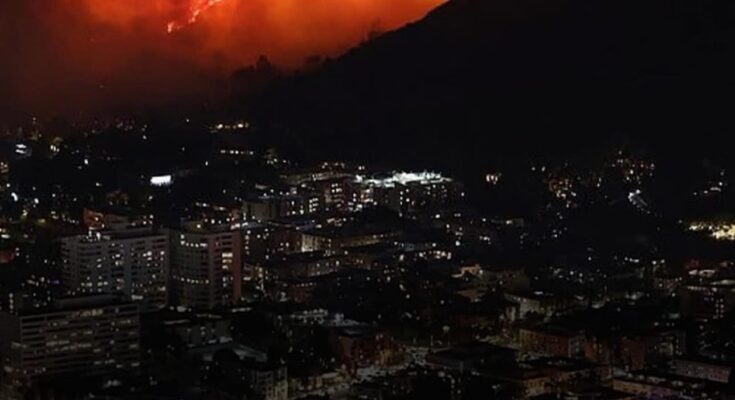A backyard spark that began as grey smoke on Tuesday morning spread out of control and became a destructive wildfire, as captured by live webcams.
Within minutes, what had started out as smoke had transformed into a dense cloud, and the dry bushes and plants were being whipped up by flames.
“Spreading at a speed beyond anything we’ve seen,” the wildfire says. According to LA Fire Chief Kristin Crowley, “it’s now unlike anything we have seen in our lifetime.”

Unfortunately, the current weather conditions make it seem impossible to put out the out-of-control wildfire in the coming days.
Approximately 179,783 people in Los Angeles County are currently under evacuation orders. According to the BBC, an additional 200,000 people are under evacuation warning, which means they could have to leave at any time.
Numerous people are hurt, and at least five people have died.

Unfortunately, the current weather conditions make it seem impossible to put out the out-of-control wildfire in the coming days.
Approximately 179,783 people in Los Angeles County are currently under evacuation orders. According to the BBC, an additional 200,000 people are under evacuation warning, which means they could have to leave at any time.
Numerous people are hurt, and at least five people have died.


Unfortunately, these forecasts were accurate.
Experts believe that in addition to weather, climate change is a major factor in the January wildfires.
According to the National Oceanic and Atmospheric Administration, “the risk and extent of wildfires in the western United States have increased due in large part to climate change, which includes increased heat, prolonged drought, and a thirsty atmosphere.”

Heavy rains from El Niño last year fueled vegetation growth in the Los Angeles area, which has since dried out and become highly flammable, according to the Daily Mail, which cited experts on the subject.
After the wildfire broke out, Southern California was hit by “devil winds,” officially called Santa Ana winds, which are warm, dry gusts that blow inland from the northeast instead of the region’s typical cooler winds from the Pacific Ocean.



